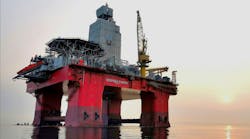Rick Wilkinson
OGJ Correspondent
MELBOURNE, Oct. 14 -- Australian Minister for Industry, Tourism, and Resources Ian Macfarlane is pressing for a new set of petroleum exploration tax breaks to be incorporated in the government's federal budget in May 2006.
Australia's oil self-sufficiency has fallen to about 75% from a high of about 95% in the early 1990s. Forecasts state that without any significant discoveries that percentage could drop to about 22% by 2010.
One of Macfarlane's proposals is to introduce a flow-through-share scheme that would involve changes in tax laws to make it easier for exploration companies to raise capital by issuing shares that investors can claim against their individual tax returns. Such a scheme has previously run up against opposition from the Australian Treasury, but this opposition is said to be weakening with the country's diminishing petroleum self-sufficiency and its implications for future balance of payments now a crucial issue.
In another aspect of energy security, Macfarlane has ruled out any attempt by the government to set up a strategic stockpile of oil and product reserves. However, he wants to encourage the nation's refiners to expand capacity. One way to do this would be to restart ExxonMobil Corp.'s 76,000 b/d Port Stanvac refinery in Adelaide, which was shuttered in 2003 in the face of competition from Asia.
ExxonMobil has previously said it would review the status of Port Stanvac in 2006.
Macfarlane also wants oil companies to support marketing of ethanol-blended gasoline to make it more attractive to the country's motorists. Recently, there have been scare campaigns about the dangers of ethanol in vehicle engines that began when some operators added as much as 20% ethanol to the fuel mix.
Several companies, including BP PLC and Caltex, market 10% ethanol-blended gasoline, but the market for the fuel is small.
